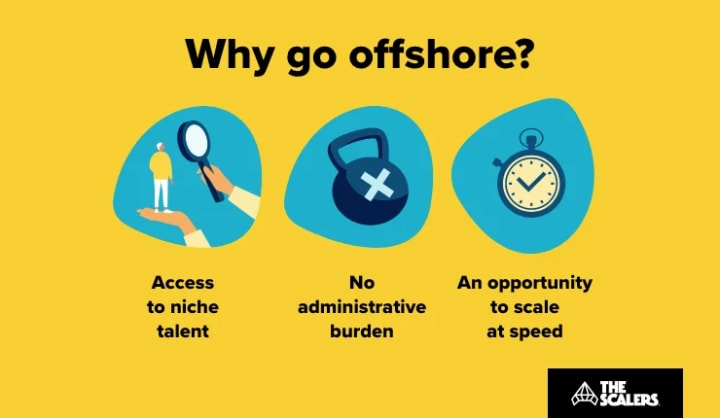The Ultimate Handbook for CTOs: Mastering Offshore Software Development
The definitive guide for CTOs

The software industry is overcrowded. Despite the crisis hitting the big tech world, the number of software companies is expected to reach over a million in the next decade.
Almost half of these organisations cluster in Western Europe and American cities. The result? Fierce competition, high operational costs, and a talent shortage in engineering roles.
If you’re a seasoned tech leader in a US or European-based firm, you’re well aware of these challenges. Hiring local engineers is pricey and limits your access to top tech professionals.
In a competitive marketplace, offshore software development is a game-changer. Building engineering teams in countries like India is cost-effective and can provide access to a highly skilled talent pool.
But how can you leverage offshore dedicated teams to benefit your business?
Read on to discover what offshore software development (really) is, the benefits of the offshore model, and how to implement it.
Let’s get started!
What is offshore software development
Offshore software development means hiring an engineering team overseas to build software for your company.
To maximise efficiency, organisations that go offshore often establish a new office in the country of their choice with dedicated development teams. These teams work in fully equipped facilities known as offshore development centres.
For instance, tech giants like Google, Microsoft, and Apple have established Research and Development Centres (R&D Centres) in Bangalore, India.
The large pool of world-class developers and the opportunity to scale quickly allow them to increase their output and improve their technical expertise without significant stress, inconvenience, or expense.
Who should use offshore development
If you’re wondering whether to invest in offshore development, ask yourself: can I find and hire the right tech talent at home?
If the answer is ‘no’, you should consider investing in it.
Generally, two types of organisations leverage offshore software development:
Non-technical core businesses. E.g., retail or hospitality firms that need help transforming their existing website or developing digital products for their customers.
Companies seeking to expand their in-house development teams. E.g., financial corporations that want to increase their business’s value and grow their tech proficiency.
The first type of organisations lack software expertise and require competent developers to maintain and build their technology. The second already have in-house development teams but want to scale up to take on more significant contracts, deliver more value to users or outpace their competitors.
In both cases, a dedicated offshore team is an ideal solution since talented developers are expensive and hard to find locally.
3 key benefits of offshore development
Offshoring software development offers numerous advantages to companies of all sizes, from startups to major corporations.

These are the three key benefits you’ll get when going offshore:
- Access top talent
When offshoring your software development, the world is your talent pool.
From Eastern European developers’ strong work ethic to savvy and English-proficient Indian engineers, top tech talent flourishes everywhere… except in the US and its Western neighbours.
The U.S. Bureau of Labor Statistics predicts demand for nearly 170,000 developer positions annually until the decade’s end. The problem is there aren’t enough talented developers to fill the roles.
Although high education institutions in the US are pushing IT and software development courses, it will take time for graduates to become experts in their specific fields. Meanwhile, the demand for developers continues to race away.
That’s why, today, top talent availability is the main reason companies are looking to build offshore teams in countries like Poland or India.
India produces 1.5 million engineering graduates yearly with solid training backgrounds and excellent English language skills. These engineers leave university ready to embark on professional careers and build software in international organisations.
- Scale quickly
Scaling your offshore software development team is faster than expanding your local team.
And easier.
Offshore development companies offer several flexible cooperation models that allow you to build, manage, and scale up engineering teams on demand.
Let’s say you create a dedicated development team of five engineers. After a few months, your business grows, and you need more developers to design a new product and meet your customer expectations.
Your offshore partner has your back. Ask them how many engineers you need to scale your team, and you’ll get top-notch tech specialists in no time.
- Focus on your core business
A good offshore software development company handles recruitment, administration, payroll, and other processes for you. A great one gives you peace of mind.
And there’s nothing like the security of having a partner you can trust while you prioritise other crucial aspects of your business.
If you decide to offshore software development, that’s what you get. You’ll have time to focus on your core business, interact with potential clients, and grow your company.
In the meantime, your offshore partner will hire and onboard top developers, among other tedious tasks.
Click here to learn more about : https://thescalers.com/offshore-software-development-definite-guide-for-ceo/
- Best offshore development locations
- How to choose an offshore partner
- How to manage an offshore team
- Why you should consider offshoring to India
- In summary: the only software offshoring guide for CTOs you’ll ever need
Original source:https://thescalers.com/offshore-software-development-definite-guide-for-ceo/





Comments
There are no comments for this story
Be the first to respond and start the conversation.